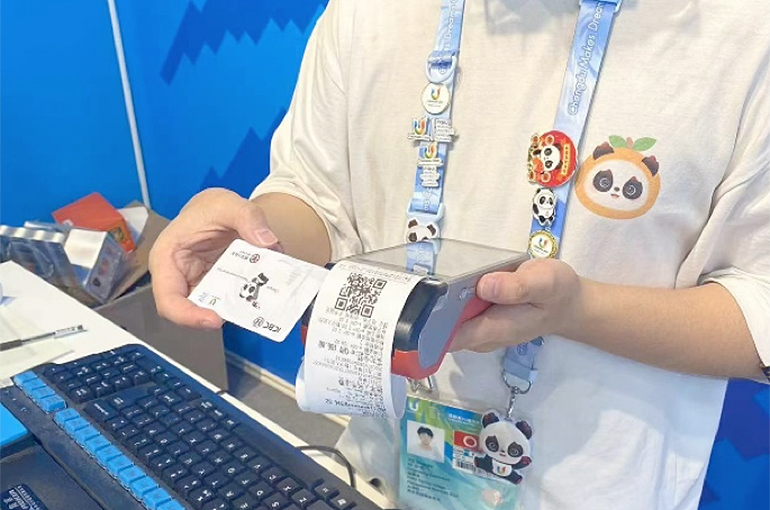 E-Yuan Was a Winner at Chengdu Universiade
E-Yuan Was a Winner at Chengdu Universiade(Yicai) Aug. 10 -- Following the 2022 Beijing Winter Olympics, the FISU World University Games recently held in Chengdu were another big international sports event that boosted the use of China’s digital yuan, with e-yuan transactions surging during the games.
An e-yuan wallet in the form of a plastic card was launched at the Universiade, which ran from July 28 to Aug. 8, with Industrial and Commercial Bank of China supporting its use, Yicai learned. It was also the first physical hard wallet issued on a large scale for an open and international sports event.
All merchants in the Universiade Village accepted payments made with the card, which is handy for small denomination purchases, according to an ICBC employee. Payments are made by swiping the card on a smart point-of-sale device, while the card can be topped up using ICBC’s smart currency exchange machine.
The digital wallet is safe and anonymous to use, ensuring total privacy and offering a convenient way for athletes and spectators to buy things with e-yuan.
One person wrote on the app of lifestyle services giant Meituan that a craft beer and an electronic payment that respects personal privacy enabled them to enjoy a great evening.
Convenient payment and easy top-ups present the opportunity for rapid growth in the use of e-yuan. Average daily e-yuan transactions jumped 51 percent over the course of the games, Yicai learned from Meituan, while the value surged 66 percent.
ICBC also produced booklets on how to use the card written in Chinese, English, French, and Spanish, the staffer said. The card was a hit with the athletes since it is beautiful, practical, and collectible, the person added.
Apart from this e-yuan hard wallet, Universiade participants and spectators from nearly 200 countries and regions were also able to use soft wallets through the e-yuan’s mobile app.
Yicai also learned that the competition venues, main media center, official ticketing services provider, partner hotels, and franchised merchandise distributors all accepted e-yuan payments. A total of 800,000 merchants and outlets in Chengdu and all of its taxi firms also took payment in the digital currency.
Editors: Tang Shihua, Peter Thomas